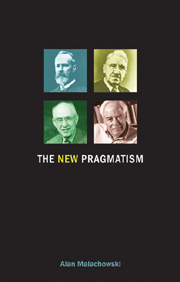Book contents
- Frontmatter
- Contents
- Preface
- Acknowledgements
- Abbreviations
- 1 Introducing the New Pragmatism
- 2 Leaving classic pragmatism behind
- 3 Rorty against the tradition
- 4 Putnam's contributions
- 5 Putnam and Rorty: pragmatism without reconciliation
- 6 Prospects
- Conclusion: the New Pragmatism and philosophy
- Notes
- Reading the New Pragmatists
- Bibliography
- Index
2 - Leaving classic pragmatism behind
- Frontmatter
- Contents
- Preface
- Acknowledgements
- Abbreviations
- 1 Introducing the New Pragmatism
- 2 Leaving classic pragmatism behind
- 3 Rorty against the tradition
- 4 Putnam's contributions
- 5 Putnam and Rorty: pragmatism without reconciliation
- 6 Prospects
- Conclusion: the New Pragmatism and philosophy
- Notes
- Reading the New Pragmatists
- Bibliography
- Index
Summary
The whole function of philosophy ought to be to find the characteristic influences which you and I would undergo at a determinate moment in our lives, if one or other formula of the universe were true.
(William James, Pragmatism and The Meaning of Truth)The precise details of the early history of ‘classic pragmatism’ are still disputed. Nevertheless, it is quite clear who the key figures were.
There were three of them. Charles Sanders Peirce was the founder in the sense of coining pragmatism's name and some of the main ideas first associated with it. But, according to John Murphy (1990: 33), it was William James who first used the designator ‘pragmatism’ in print. He extended the scope of Peirce's ideas, and attracted much greater attention to pragmatism in doing so. When he linked up with a keen ally in America, John Dewey, pragmatism was launched as a fully fledged philosophical movement.
Belief in action: Peirce
On his own account (PWP: 269–71), Peirce was prompted to conceive of pragmatism as a distinctive approach to philosophy by discussions that took place between him and a group of “young men in Old Cambridge” who began meeting together in 1872 and called themselves, “half ironically, half defiantly, ‘The Metaphysical Club’”. The members included James, Francis Ellingwood Abbot, John Fiske, Nicholas St John Green, Oliver Wendell Holmes, Joseph Bangs Warner and Chauncey Wright. Of these, Peirce mentioned St John Green as being particularly notable because “he often urged the importance of applying Bain's definition of belief as ‘that upon which a man is prepared to act’”.
- Type
- Chapter
- Information
- The New Pragmatism , pp. 17 - 32Publisher: Acumen PublishingPrint publication year: 2009



